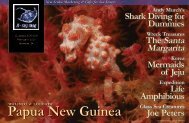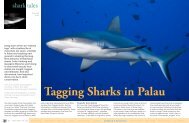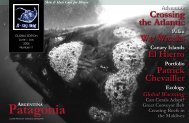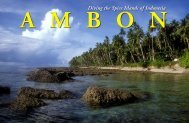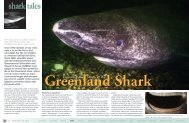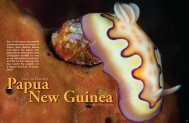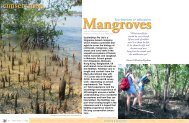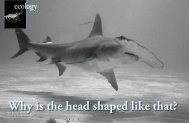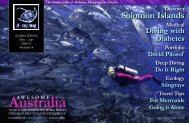Medium resolution version of X-Ray Magazine (96 dpi)
Medium resolution version of X-Ray Magazine (96 dpi)
Medium resolution version of X-Ray Magazine (96 dpi)
You also want an ePaper? Increase the reach of your titles
YUMPU automatically turns print PDFs into web optimized ePapers that Google loves.
pr<strong>of</strong>ile<br />
Dr Sylvia Earle<br />
NOAA<br />
TOP: Earle in action studying marine plant life<br />
INSET: Earle displays samples to an aquanaut inside TEKTITE<br />
NURP<br />
fraction <strong>of</strong> that small amount <strong>of</strong> the<br />
waters <strong>of</strong> the United States have full<br />
protection in the way that a national<br />
park does.<br />
And around the world, although<br />
there are more than 3000 places in<br />
the ocean being investigated for<br />
some form <strong>of</strong> protection, it’s a tiny<br />
fraction <strong>of</strong> that amount that has<br />
real protection in a similar way that<br />
we think <strong>of</strong> in a park where in you<br />
don’t cut down the trees or trap the<br />
wildlife or catch the fish.<br />
We use the ocean in mutliple<br />
ways including recreation, diving,<br />
and all the rest, but many <strong>of</strong> the<br />
ways we use the ocean are consumptively<br />
destructive. If we are to<br />
have fish in the sea in the future, for<br />
whatever reason, to take them out<br />
<strong>of</strong> the sea, we have to do what we<br />
have in some ways already done<br />
to creatures on the land: protect<br />
the breeding areas and the feeding<br />
areas. Otherwise, we might breach<br />
migration routes, and so on.<br />
In fact, a fraction <strong>of</strong> one percent<br />
<strong>of</strong> the ocean has any known protection<br />
as compared to the land<br />
where about 12% has fairly extensive<br />
protection.<br />
It was about 100 years ago that<br />
people began to get serious about<br />
protecting wildlife on the land and<br />
protecting habitats where they<br />
lived. If people wanted to have<br />
ducks and other birds to consume,<br />
they had to protect the breeding<br />
areas, the feeding areas, the<br />
boundaries. Now we need to simply<br />
apply these measures for the sea...<br />
for tuna, for swordfish, for sharks for<br />
heaven’s sakes... for anything that<br />
is out there, we must, at this stage,<br />
seize the opportunity that we have<br />
now, but won’t have much longer.<br />
You know, all we have is right<br />
now. I met a psychic that said that<br />
we have a chance like no generation<br />
before us to make a positive<br />
difference just as our predecessors<br />
did years ago when the idea <strong>of</strong> protecting<br />
wildlife on land came with a<br />
purpose. Now, it’s our turn with the<br />
ocean—this time, our time, to make<br />
decisions that will resolve the balance<br />
through years to come.<br />
Eighteen thousand square miles<br />
<strong>of</strong> US water sounds like alot, but<br />
the Great Barrier Reef in Australia<br />
is 144 square miles <strong>of</strong> ocean. And<br />
even then, despite that vast area<br />
has enjoyed such protection since<br />
the mid 1970’s, there are some real<br />
problems. It’s more <strong>of</strong> a management<br />
area than it is a fully protected<br />
area.<br />
Good news: a lot <strong>of</strong> things are<br />
better <strong>of</strong>f than they would have<br />
been had they been without any<br />
protection at all. But just last year,<br />
it was at a point where measures<br />
had to be taken to really do<br />
something more. So, full protection<br />
was increased from about<br />
6% to 33%, a good third <strong>of</strong> that<br />
vast system, now has been given<br />
better protection.<br />
And in the United States, places<br />
that we have had a chance<br />
to go to during the<br />
Sustainable Seas<br />
series <strong>of</strong> expeditions,<br />
is now under<br />
consideration to<br />
become an even<br />
larger body <strong>of</strong><br />
water under protection—the<br />
north<br />
western Hawaiian<br />
Islands.<br />
But again, when<br />
we think about<br />
the ocean as a<br />
whole—how much<br />
there is, how much<br />
there is to do—these are baby<br />
steps, and we want some giant<br />
steps.<br />
So, I first, salute you for all that<br />
you are doing, and I challenge you,<br />
that when we get together, and I<br />
will come back in years ahead, we<br />
should be mindful <strong>of</strong> what progress<br />
we can make as individuals, as<br />
organizations, whatever it is, whatever<br />
talents you have... I get asked<br />
alot, “I am just one person. What<br />
can I do?”<br />
First thing you do is pick up the<br />
mirror and look at it and say, “I take<br />
great underwater photographs.”<br />
Use that talent. Or you can say, “I<br />
can play wonderful music.” Use that<br />
talent. If you are good in math, or<br />
you can draw or you have a way<br />
with words—what ever it is, use it, so<br />
that you can look the next generation<br />
in the eye, and you can look<br />
yourself in the eye, and be confident<br />
that you have done what you<br />
can to make a difference. Thank<br />
you.<br />
For more information about Dr Sylvia<br />
Earle and her organization, Deep<br />
Ocean Exploration and Research,<br />
visit: www.doer-inc.com ■<br />
Books about Dr Sylvia Earle:<br />
Meet My Grandmother: She’s a Deep-Sea Explorer<br />
(Millbrook Press) by Lisa Tucker McElroy<br />
Sylvia Earle: Deep Sea Explorer<br />
(Women Explorers) by Susan Tyler Hitchcock<br />
Sylvia Earle: Guardian <strong>of</strong> the Sea<br />
(Lerner Biographies) by Beth Baker<br />
Sylvia Earle: Deep Sea Explorer and Ocean Activist<br />
(Women Hall <strong>of</strong> Famers in Mathematics and Science) by Katherine White<br />
86 X-RAY MAG : 6 : 2005 EDITORIAL FEATURES TRAVEL NEWS EQUIPMENT BOOKS SCIENCE & ECOLOGY EDUCATION PROFILES PORTFOLIO CLASSIFIED



